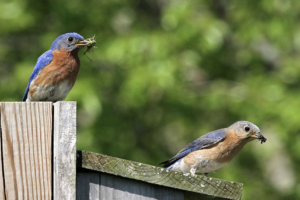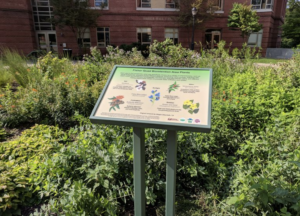Connect with us
Office of Sustainability
746 High Street
Easton PA, 18042
sustainability@lafayette.edu
We are constantly studying our local environments, knowing that biodiversity plays an important role in maintaining healthy ecosystems and the continuation of all forms of life on the planet, including here in our community.
 Lafayette faculty and students are working on a variety of research projects related to local biodiversity and ecology.
Lafayette faculty and students are working on a variety of research projects related to local biodiversity and ecology.
The College has longstanding relationships with the Bushkill Stream Conservancy and Jacobsburg Environmental Education Center and has participated in projects to enhance the stream corridor, provide vernal pools, and construct naturalized detention ponds and wetlands.
Visit our Academics & Research page for more details on ongoing projects.
To ensure ongoing protection and wellbeing of our local ecosystem, as well as best practices when it comes to soil health and water usage, Lafayette instituted a Landscaping Policy. This policy requires all new plantings on campus to be native species, among other best-practices.

Stemming from a student project in 2019 and continuing today through a Campus Biodiversity Fellow project, over 200 trees have been identified on campus, many of which have had accompanying plaques installed. Explore the digital map of these trees to learn more about their unique features.
To support local pollinators, such as butterflies and bees, Lafayette has a pollinator garden located by March Field.

Additionally, in 2017, the area in front of the Fisher Halls was transformed into the campus’ first-ever stormwater bioretention area to slow and filter stormwater so that fewer pollutants reach Bushkill Creek. The bioretention area vegetation was scientifically and strategically selected for its ability to withstand saturated conditions but also to be able to thrive when the water dries up. The garden is comprised of native perennial plants that encourage biodiversity and attract pollinators, which is critical to supporting a declining population of bees and other pollinators.
The bioretention area was funded by the Department of Conservation and Natural Resources and the Lehigh Gap Nature Center.
Utilizing campus as a living laboratory, faculty and students in Biology and Civil & Environmental Engineering departments, in conjunction with scientists across the country, have studied the problem of window-killed birds on our campus. To address the issue, Birdsavers have been installed in many buildings and are added to windows in any new construction. Birdsavers are current installed in Rockwell Integrated Sciences Center, Acopian, Skillman Library, Hugel and the Willams Art Center to minimize the problem.
A 50-foot buffer of native grasses and wildflowers was established between the garden and neighboring agricultural field, to allow native species to flourish.
Created by a Sustainability Impact Fellow, the self-guided Campus Biodiversity Tour is coming soon! Stay tuned!